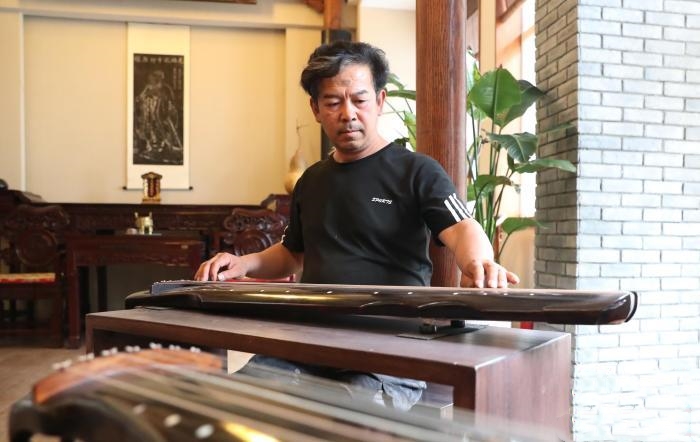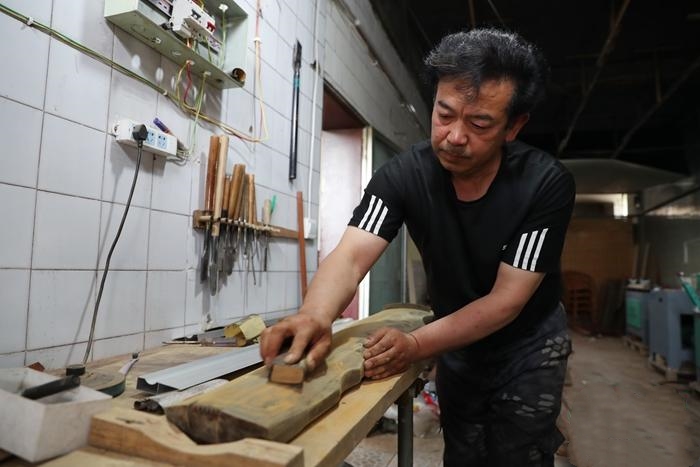Ma Guangming, a craftsman of Zhuo Qin in Ningxia, inherits the ancient sound of thousands of years
Zhuo Qin is an old craft that has been handed down for thousands of years. Up to now, there are few people who can play the ancient zither, fewer people who know how to play the ancient zither, and even fewer people who can both play and play the ancient zither. Ma Guangming, a craftsman of Zhuo Qin in Yinchuan, Ningxia, not only knows the music of ancient Qin, but also Zhuo Qin. For more than ten years, with his ingenuity, he has carved out thousands of ancient zither pieces, inheriting the ancient sound of thousands of years.

On October 19, when the reporter walked into Ma Guangming's studio, he saw that his mask covered half of his face and carefully pushed the plane. The wood ash was flying under the lamp. The slender wooden body of the guqin changed into a musical instrument with gorgeous patterns and symbols.
Guqin is an ancient plucking instrument in China, which has a history of more than 4000 years. In 2003, Guqin was included in the list of "Representative Works of Human Oral and Intangible Cultural Heritage" by the United Nations; In 2006, Guqin was included in the first batch of national intangible cultural heritage list. The art of making guqin is called "Zhuo Qin". In recent years, the inheritance and protection of excellent traditional culture and intangible cultural heritage has been strengthened, and the playing and production skills of ancient zither have also gradually recovered. Under this background, Ma Guangming embarked on the road of playing and "carving" the zither.

"All the lines and radians on the guqin panel were polished with a plane, shovel and file." Ma Guangming said that the ancient zither looks simple, but it is very complicated to make.
While talking, Ma Guangming picked up a tung wood board, carefully observed its annual ring texture, and gently tapped with his knuckles to hear the tone. "Then there are hundreds of processes, such as drawing, setting out, making the surface of the instrument, pulling out the inner cavity, combining the instrument, assembling parts, avoiding seams, painting, pushing light, and fitting the feet. It took two or three years to complete the production of the ancient instrument. The ancient instrument made in this way has the characteristics of wide range, rich timbre, and long lasting sound. The sound quality is incomparable to modern mechanical instruments." Ma Guangming told reporters.
Over the years, Ma Guangming has been using the ancient Zhuo Qin, which was handed down from the Tang Dynasty. The ancient method of making ancient zither is complex in technology and long in production cycle, which tests the artist's artistic foundation, carpentry foundation and the ability to play ancient zither. After the wood is selected, it should be dried for at least one year, and then painted with more than 60 natural paints. Every time you paint, you should put the piano in the shade room for more than half a month, and it can only be used for the second time after it is dried in the shade. "It takes time to polish a good zither. Zhuo Qin is often not the person who chooses the zither, but the person who chooses the zither. If you are not calm, you can't make a zither at all. If you have any distractions, your taste will change." Ma Guangming said.

From a primitive old wood to an "instrument of sages" that can produce elegant sounds, Ma Guangming has mastered hundreds of processes. With his perseverance, he "finds fault" with each process and promotes the Zhuo Qin technique to the realm of artistic creation.
With the advent of guqin, Ma Guangming has also been recognized by industry insiders and zither friends, and many people are attracted to him for making guqin.
In Ma Guangming's opinion, the process of Zhuo Qin is not only to polish a piece of wood and complete a process, but also to think about the culture and inheritance. The ancient Qin skills need to be more inherited and developed.
As a result, Ma Guangming broke the limitation of making and selling zither and began to provide public welfare classes for a long time to teach the citizens the skills of zither. Ma Guangming said that in recent years, with the increase of guqin lovers, many people came to his studio to learn about and customize guqin, which also gave him hope for the development of guqin. In the future, he will take it as his own responsibility to reproduce the art of guqin, regain the memory of guqin culture, and inherit the blood of national culture. He will continue to inherit and develop guqin culture, so that more people can understand and master this skill.
 渝公网安备 50010702504639号
渝公网安备 50010702504639号